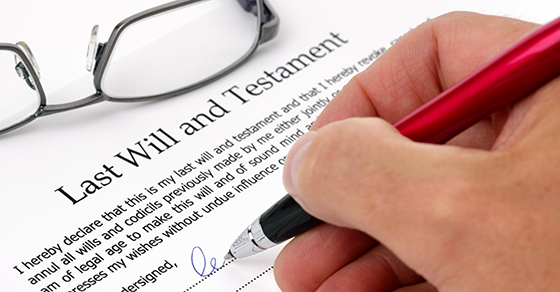You probably don’t have to be told about the need for a will. But do you know what provisions should be included and what’s best to leave out? The answers to those questions depend on your situation and may depend on state law.
Basic provisions
Typically, a will begins with an introductory clause, identifying yourself along with where you reside (city, state, county, etc.). It should also state that this is your official will and replaces any previous wills.
After the introductory clause, a will generally explains how your debts and funeral expenses are to be paid. The provisions for repaying debt generally reflect applicable state laws.
Don’t include specific instructions for funeral arrangements. It’s likely that your will won’t be accessed in time. Spell out your wishes in a letter of instructions, which is an informal letter to your family.
A will may also be used to name a guardian for minor children. To be on the safe side, name a backup in case your initial choice is unable or unwilling to serve as guardian or predeceases you.
Specific bequests
One of the major sections of your will — and the one that usually requires the most introspection — divides up your remaining assets. Outside of your residuary estate, you’ll likely want to make specific bequests of tangible personal property to designated beneficiaries.
If you’re using a trust to transfer property, make sure you identify the property that remains outside the trust, such as furniture and electronic devices. Typically, these items won’t be suitable for inclusion in a trust. If your estate includes real estate, include detailed information about the property and identify the specific beneficiaries.
Once you’ve covered real estate and other tangible property, move on to intangible property, such as cash and securities. Again, you may handle these items through specific bequests where you describe the property the best you can.
Finally, most wills contain a residuary clause. As a result, assets that aren’t otherwise accounted for go to the named beneficiaries, often adult children, grandchildren, or a combination of family members.
Naming an executor
Toward the end of the will, name the executor — usually a relative or professional — who is responsible for administering it. Of course, this should be a reputable person whom you trust. Also, include a successor executor if the first choice is unable to perform these duties. Frequently, a professional is used in this backup capacity.
Cross the Ts and dot the Is
Your attorney will help you meet all the legal obligations for a valid will in the applicable state and keep it up to date. Sign the will, putting your initials on each page, with your signature attested to by witnesses. Include the addresses of the witnesses in case they ever need to be located. Don’t use beneficiaries as witnesses. This could lead to potential conflicts of interest.






